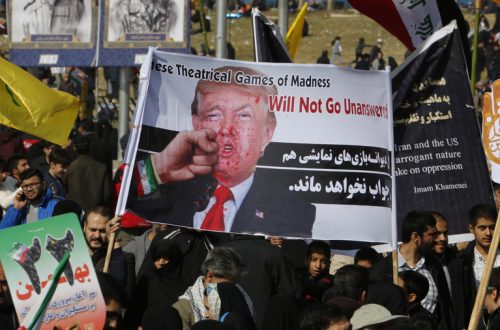This is a cross-post by Kyle Orton
The key thing to understand about the Joint Comprehensive Plan of Action (JCPOA), the nuclear accord announced on April 2 between the P5+1 and Iran, is that it does not exist. The British Foreign Secretary Philip Hammond said at one point, “We envisage being able to deliver a narrative,” adding that this might not be written and—these being forgiving times—Iran’s narrative need not match the West’s. In other words, nothing was signed or agreed to. This is the reason for the wild discrepancies between the American and Iranian JCPOA “factsheets”: both are drawing from a rolling text that is ostensibly to lead to a “final” or “comprehensive” deal and spinning it to their own respective advantage. The administration has as much as said so with its mantra that “nothing is agreed until everything is agreed”.
The purpose of the announcement of the JCPOA therefore was, charitably, to “build political momentum toward a final agreement“. Less charitably it was intended to “demonstrate progress in order to fend off congressional action,” as Obama’s former nuclear adviser Gary Samore put it. In that at least it was successful. Congress had been set to pass sanctions that would be triggered if Iran refused to sign a final deal verifiably surrendering a weaponized nuclear capacity by June 30; now those sanctions will not even be passed into law until after June 30. The legislation being moved by Senator Foreign Relations Committee chair Bob Corker (R-Tenn.) to allow Congress a say in the Iran deal is likely to be watered down so much, in search of bipartisan support, that it won’t even require that “the administration certify that Tehran has not directly supported terrorist attacks against the United States”.
One can assess the “Lausanne framework” on the technical details and whether this prevents Iran gaining nuclear weapons, and the administration has sent out U.S. Energy Secretary Ernest Moniz, armed with his PhD in theoretical physics and a ferocious hairdo, to sell the deal on these terms. But the real consequences of this diplomacy are on the ground in the Middle East, where the United States is underwriting the expansion of Iranian hegemony.
The nuclear accord is a means the Obama administration is using to the end of détente with Iran, which is based on the idea that the U.S. and Iran can mutually benefit from common interests, especially in combatting (Sunni) terrorists like the Islamic State. Obama has said that America will “hopefully at some point” stop Iran’s “destabilizing activities” in the region and will be in “a stronger position to do so if the nuclear issue has been put in a box.” Unfortunately this compartmentalization is a fantasy, and the concessions Iran has wrung from the U.S., in the nuclear negotiations and in the region, are permanent, and even if Iran is kept from nuclear weapons, it now has a regional Empire that has escalated the killing and chaos in an already unstable region and which poses a direct threat to Western security.
You can read the rest of Kyle’s post here


